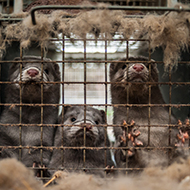
The RSPCA has responded to the reports.
The UK Government is set to drop plans to ban the import of fur and foie gras, as reported by BBC News.
Due to be included in the Animals Abroad Bill, the measures are likely to be dropped after several cabinet ministers raised concerns about the proposals.
Producing foie gras, a luxury food which is created by force-feeding ducks and geese, is illegal in the UK. Despite this, it is still legal to import, and is often imported from France, where foie gras is considered a heritage product.
Similarly, fur farming has been illegal in England and Wales since 2000, and Scotland and Northern Ireland since 2002, but fur is still able to be imported.
Claire Bass, executive director for Humane Society International UK, commented on the potential dropping of the measures: “Polls show that 72 per cent of Brits want a fur ban, and over 140 MPs from all parties agree that we should not remain complicit in the death and suffering of millions of animals caged or trapped overseas for frivolous fashion.
“Last year there were 30,000 responses to the government’s Call for Evidence on the fur trade, we are calling for the results to be published.
“This evidence should determine government policy, not the personal preferences and hunches of a small number of influential Conservatives.”
Executive director at Animal Equality UK, Abigail Penny, told the BBC that the ban on foie gras, 'matters a lot' to animals that are suffering and struggling, and called the food product 'immensely cruel'.
A spokesperson for the Government said that a final decision had not yet been made on either measure, but that: “this Government is united in its commitment to upholding its world leading standards in animal welfare.”
The RSPCA told MRCVSOnline: “We are alarmed about reports that the Government is changing its mind on banning imports of fur and foie gras. Both these practices cause suffering to animals and by allowing them to be imported here the UK is complicit in these cruel trades. This is a huge step backwards for animal welfare.
“Farming and trapping wild animals for fur can be a cruel and unnecessary business that should have no place in the modern world. Even though fur is no longer farmed in the UK, it is still legal to import and sell it here.
“So the UK remains complicit in the continuation of the global fur market, profiting from this cruel international trade. It is shameful and it’s high time we got our house in order and made fur imports and sales illegal.
“Traditional foie gras is made from the livers of ducks or geese that have been force-fed, a practice considered cruel by the RSPCA and leading animal welfare scientists, and our laws effectively already prohibit it from being produced here due to the suffering involved.
“But more than 150 tonnes are still imported from mainland Europe each year and make their way into our supermarkets, restaurants and delicatessens.
“If the method of making a product causes so much animal suffering that producing it here would breach animal welfare law, then surely importing that product from another country should be illegal too.
“The government should stand by its commitment to maintain and improve animal welfare standards, and ban the import of fur and foie gras once and for all.
“In the meantime, everyone can help to reduce the trade - and the impact on welfare - by committing not to purchase fur or foie gras.”



 The Veterinary Medicines Directorate (VMD) is inviting applications from veterinary students to attend a one-week extramural studies (EMS) placement in July 2026.
The Veterinary Medicines Directorate (VMD) is inviting applications from veterinary students to attend a one-week extramural studies (EMS) placement in July 2026.